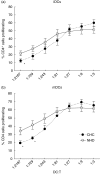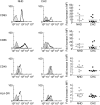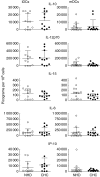Monocyte-derived dendritic cell function in chronic hepatitis C is impaired at physiological numbers of dendritic cells
- PMID: 17362265
- PMCID: PMC1941920
- DOI: 10.1111/j.1365-2249.2007.03367.x
Monocyte-derived dendritic cell function in chronic hepatitis C is impaired at physiological numbers of dendritic cells
Abstract
Monocyte-derived dendritic cells (MoDCs) are a promising cellular adjuvant for effector immune responses against tumours and chronic viral infections, including hepatitis C virus (HCV). If autologous DC therapeutic approaches are to be applied in persistent HCV infections in patients, it is important to have an unambiguous understanding of the functional status of the cell type used, namely MoDCs from patients with chronic hepatitis C (CHC) infection. Because of conflicting published reports of either impaired or normal MoDC function in CHC infection, we re-examined the ability of MoDCs from CHC and normal healthy donors (NHD) to mature to an inflammatory stimulus [tumour necrosis factor (TNF)-alpha] and their subsequent functional capabilities. Expression of maturation-associated phenotypic markers [human leucocyte antigen (HLA)-DR, CD83, CD86, CD40], allostimulatory capacity in mixed lymphocyte reactions (MLRs) and CD40-ligand-induced cytokine and chemokine generation were compared in CHC- versus NHD-MoDCs. TNF-alpha-stimulated CHC-MoDCs up-regulated phenotypic markers, but to significantly lower levels than NHD-MoDCs. At physiological ratios of DCs to T cells, CHC-MoDCs were less allostimulatory than NHD-MoDCs, but not when DC numbers were substantially increased. CHC- and NHD-MoDCs generated equivalent amounts of cytokines [TNF-alpha, interleukin (IL)-1beta, IL-6, IL-12p70, IL-15, IL-10] and chemokines [interferon-inducible protein (IP)-10, macrophage inflammatory protein (MIP)-1alpha, regulated upon activation, normal T expressed and secreted (RANTES)] after CD40 ligation. Because the functional defect was not apparent at high MoDC : T cell ratios, autologous MoDC therapy with sufficiently high numbers of DCs could, in theory, overcome any impairment of MoDC function in CHC.
Figures



Similar articles
-
Monocyte-derived dendritic cells from chronic HCV patients are not infected but show an immature phenotype and aberrant cytokine profile.Liver Int. 2007 Sep;27(7):944-53. doi: 10.1111/j.1478-3231.2007.01507.x. Liver Int. 2007. PMID: 17696933
-
Maturation of human monocyte-derived dendritic cells (MoDCs) in the presence of prostaglandin E2 optimizes CD4 and CD8 T cell-mediated responses to protein antigens: role of PGE2 in chemokine and cytokine expression by MoDCs.Int Immunol. 2005 Dec;17(12):1561-72. doi: 10.1093/intimm/dxh335. Epub 2005 Nov 22. Int Immunol. 2005. PMID: 16303787
-
IL-4 blocks TH1-polarizing/inflammatory cytokine gene expression during monocyte-derived dendritic cell differentiation through histone hypoacetylation.J Allergy Clin Immunol. 2013 Dec;132(6):1409-19. doi: 10.1016/j.jaci.2013.08.039. Epub 2013 Oct 17. J Allergy Clin Immunol. 2013. PMID: 24139608
-
CD137L-DCs, Potent Immune-Stimulators-History, Characteristics, and Perspectives.Front Immunol. 2019 Oct 2;10:2216. doi: 10.3389/fimmu.2019.02216. eCollection 2019. Front Immunol. 2019. PMID: 31632390 Free PMC article. Review.
-
HCV and innate immunity.Uirusu. 2008 Jun;58(1):19-26. doi: 10.2222/jsv.58.19. Uirusu. 2008. PMID: 19122385 Review.
Cited by
-
Dendritic cells in hepatitis C infection: can they (help) win the battle?J Gastroenterol. 2011 Apr;46(4):432-47. doi: 10.1007/s00535-011-0377-y. Epub 2011 Feb 17. J Gastroenterol. 2011. PMID: 21327958 Review.
-
Dendritic cell-based immunity and vaccination against hepatitis C virus infection.Immunology. 2012 Aug;136(4):385-96. doi: 10.1111/j.1365-2567.2012.03590.x. Immunology. 2012. PMID: 22486354 Free PMC article. Review.
-
Hepatitis C and innate immunity: recent advances.Clin Liver Dis. 2008 Aug;12(3):675-92, x. doi: 10.1016/j.cld.2008.03.003. Clin Liver Dis. 2008. PMID: 18625434 Free PMC article.
-
Immunological Dynamics Associated with Direct-Acting Antiviral Therapies in Naive and Experimented HCV Chronic-Infected Patients.Mediators Inflamm. 2019 Nov 4;2019:4738237. doi: 10.1155/2019/4738237. eCollection 2019. Mediators Inflamm. 2019. PMID: 31780860 Free PMC article.
-
Success of antiviral therapy in chronic hepatitis C infection relates to functional status of myeloid dendritic cells.Indian J Med Res. 2013 Nov;138(5):766-78. Indian J Med Res. 2013. PMID: 24434330 Free PMC article. Review.
References
-
- Rehermann B, Chisari FV. Cell mediated immune response to the hepatitis C virus. Curr Top Microbiol Immunol. 2000;242:299–325. - PubMed
-
- Lechner F, Gruener NH, Urbani S, et al. CD8+ T lymphocyte responses are induced during acute hepatitis C virus infection but are not sustained. Eur J Immunol. 2000;30:2479–87. - PubMed
-
- Ulsenheimer A, Gerlach JT, Gruener NH, et al. Detection of functionally altered hepatitis C virus-specific CD4 T cells in acute and chronic hepatitis C. Hepatology. 2003;37:1189–98. - PubMed
-
- MacDonald AJ, Duffy M, Brady MT, et al. CD4 T helper type 1 and regulatory T cells induced against the same epitopes on the core protein in hepatitis C virus-infected persons. J Infect Dis. 2002;185:720–7. - PubMed
-
- Appay V, Dunbar PR, Callan M, et al. Memory CD8+ T cells vary in differentiation phenotype in different persistent virus infections. Nat Med. 2002;8:379–85. - PubMed
Publication types
MeSH terms
Substances
LinkOut - more resources
Full Text Sources
Research Materials

